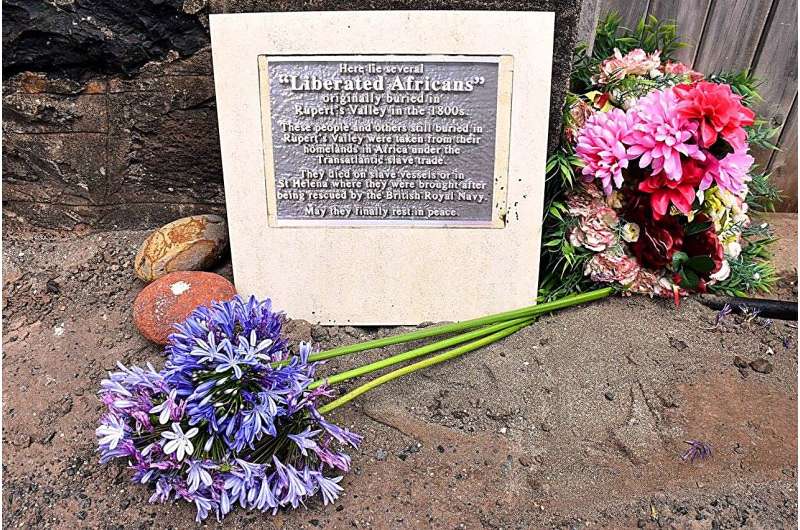This article has been reviewed according to Science X's editorial process and policies. Editors have highlighted the following attributes while ensuring the content's credibility:
fact-checked
peer-reviewed publication
trusted source
proofread
DNA analyses show St Helena's 'liberated' Africans came from West Central Africa between northern Angola and Gabon

Between 1840 and 1867, thousands of enslaved Africans who had been "liberated" from slave ships intercepted by the British Royal Navy were taken to the South Atlantic island of St Helena. But little is written in history books or otherwise known about the lives of these individuals.
Now, ancient DNA analyses reported in The American Journal of Human Genetics on September 7 offer the first direct evidence for the origins of St Helena's liberated Africans.
"It was known that they most likely originated from areas south of the equator, but where exactly they came from was unclear," says lead author Marcela Sandoval-Velasco at the University of Copenhagen, Denmark. "By sequencing their DNA and comparing it with that of thousands of living people from across sub-Saharan Africa we were able to infer where in Africa they likely originated and thereby help restore knowledge of their ancestral connections."
Historical records of the Transatlantic Slave Trade Database have indicated that most of the captives came from West Central Africa, but details have been scant.
In the new study, Sandoval-Velasco, Hannes Schroeder, and their colleagues analyzed the ancient DNA of 20 individuals who were among the thousands freed from slave ships and brought to St Helena. The ancestral remains in question came from archaeological excavations that took place between 2007 and 2008 ahead of roadwork and the construction of the island's first airport.
The DNA analyses showed that this group of liberated Africans most likely originated in the general area between northern Angola and Gabon in West Central Africa, according to the authors. They also show that most of the individuals were male, supporting a well-documented sex bias in the latter phase of the transatlantic slave trade.
The researchers say they hope the new findings create new awareness about the fate of the 27,000 liberated Africans who were brought to St Helena. They also note that this type of research can carry a lot of meaning, especially for descendant communities who are trying to recover aspects of their past.
"I think this study illustrates how ancient genomics can be used to recover long-lost aspects of the lives and experiences of enslaved and other marginalized communities whose stories were often omitted from written records or deliberately obscured," Schroeder said.
"This project was part of a larger ongoing effort by many people on and off the island to try and restore knowledge of St Helena's liberated Africans," added Helena Bennett, a co-author of the study and resident of St Helena. "We hope that by telling their story we can honor their legacy and ensure that their lives and fates are not forgotten."
More information: Hannes Schroeder & colleagues, The ancestry and geographical origins of St Helena's Liberated Africans, The American Journal of Human Genetics (2023). DOI: 10.1016/j.ajhg.2023.08.001. www.cell.com/ajhg/fulltext/S0002-9297(23)00277-X
Journal information: American Journal of Human Genetics
Provided by Cell Press



















